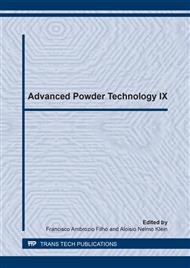p.501
p.507
p.512
p.518
p.524
p.530
p.535
p.540
p.546
Sintered Fe50Ni Alloy Produced by Mixing Iron and Nickel Powders
Abstract:
Fe50Ni alloys are used when very high magnetic permeabilities are necessary. Parts of these alloys can be produce by different mechanical processes. Metallurgical processes as investment casting and powder metallurgy can also be used. Sintered Fe50Ni parts have two disadvantages, in terms of magnetic properties: the presence of porosity and the limited grain size. This paper investigates the effects of compactation pressure on the final microstructure and density. Mixtures of atomized iron and carbonyl nickel powder were uniaxially pressed. Cylindrical samples with around 6.5g/cm3 of green density were vacuum sintered at 1220 °C. After sintering samples were cold deformed and then heat treated.
Info:
Periodical:
Pages:
524-529
DOI:
Citation:
Online since:
December 2014
Keywords:
Price:
Сopyright:
© 2014 Trans Tech Publications Ltd. All Rights Reserved
Share:
Citation:


